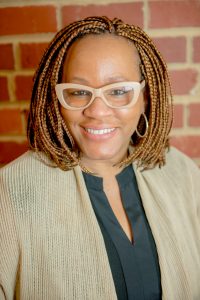School of Divinity administrator named assistant teaching professor

Shonda R. Jones
This is a guest post from the School of Divinity:
Shonda R. Jones has been named assistant teaching professor in intercultural theological education at the School of Divinity. Jones will continue serving in her role as associate dean of admissions and student services. As assistant teaching professor, she will link the intercultural competency work she has long been doing with students, faculty and staff as associate dean with classroom teaching.
“The realities of contemporary life and ministry demand that religious leaders develop intercultural competency and cultivate a wide range of cross-cultural skills, “ said Jill Y. Crainshaw, acting dean and Blackburn Professor of worship and liturgical theology at the School of Divinity. “Shonda has provided vital leadership in recent years as the school has expanded our co-curricular offerings in these areas.”
Jones will guide the school’s work to integrate theory and practice in this important dimension of ministry by providing related course offerings. She is uniquely equipped to teach courses in intercultural theological education not only because of her doctoral studies emphasis but also because of her ongoing training in and experience in intercultural competency.
“Religious leaders, now more than ever, need to have the capacity to effectively bridge differences and commonalities in ways that help us to be faithful to the various communities we serve,” said Jones. “The work of intercultural theological education is both the work of the soul and the work the body. Declaring that we want to live in a just society where all humans flourish is also to embody seeing, serving, loving, and being with those who are culturally different, as well as to communicate appropriately in beloved community.”
In 2014 she completed her Doctor of Education in Higher Education Administration from the Department of Educational Leadership, Policy, and Technology Studies in the Graduate School of the University of Alabama. Her dissertation, entitled Graduate Theology School Choice: An Examination of Racial/Ethnic Minority Master of Divinity Students, examined the contextual layers of the school choice process. Drawing on a conceptual model that integrates both economic and sociological perspectives, her work assumed that students’ graduate school decisions in theology are determined, at least in part, by their “habitus,” the system of values and beliefs that shapes their views and interpretations. Similarly, focus was given to the structural and cultural factors, or organizational habitus, experienced within the undergraduate and other institutional contexts from which racial/ethnic Master of Divinity students emerge.
Since 2011, Jones has led the admissions and student services team at the School of Divinity with efforts resulting in a 23 percent increase in applications, 25 percent increase in size of student body, and 35 percent increase in ethnic minority representation among the student body.
Jones also provides leadership at Wake Forest in several other ways. She has served as chair of the Diversity and Inclusion Partners Council through the Office of Diversity and Inclusion and as a Deputy Coordinator for Title IX. She also led an effort to establish a Grads to Golf program at the School of Business. Grads to Golf is a program of the EWGA (Executive Women’s Golf Association) that provides a diverse group of graduate students with the skills and knowledge to use golf as a business tool. Jones is a member of the EWGA Board of Directors.
Prior to her appointment at Wake Forest, Jones was a senior administrator at Emory University’s Candler School of Theology and Perkins School of Theology at Southern Methodist University. She is an Ordained Elder in the North Texas Annual Conference of the United Methodist Church and has actively served congregations in Texas, Georgia, and North Carolina.
Jones received her Master of Divinity from Brite Divinity School at Texas Christian University (TCU) after receiving a B.A. from TCU as well. She was among the first Ronald McNair Scholars in the country. Her areas of interest include womanist theology, ethics, culture, student recruitment, vocational discernment, school choice in theological education, and intersections in church, society, and higher education.
Categories: University Announcements
